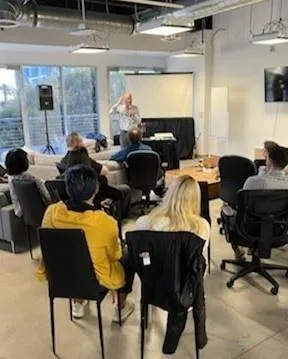
Ravé Strategy Studio


Up-Skill Leaders In Your Organization And Win!
Higher Customer Satisfaction
Better Operational Efficiency
More Product and Work Quality
Less Rework
Higher Productivity
Impact Leaders Blog

Responsible = Able to Create a Response
The difference between taking responsibility and being responsible is important.
Taking responsibility implies that responsibility is outside of us. Separate from us. Something we can take in large or small amounts.
“I take responsibility for my part.”
Being responsible, on the other hand, means that one is 100% responsible for how one perceives and responds to any situation. One always can choose what they think and how they interpret a situation.
When Being Responsible is everyone’s responsibility, then team culture reaches its zenith.
Improve leaders in three key areas:

Self-Leadership
Leadership starts from within. Leaders are self-aware and have an honest view of themselves and recognize their impact and influence on others. They lead authentically with personal values, purpose, and vision. Self-leadership means being responsible for results, choices, actions, inactions, behaviors, thoughts, communication, and attitude. It also means demonstrating resilience and consistent performance under pressure.
Training themes include:
Developing Self-Awareness
Developing E.Q. for Sustainable High Performance
Exploring Biases
Being a Self-Starter
Responsibility
Time-Management
Showing up as a leader
Integrity
Inspiring Trust
Power of Networking
Handling Uncertainty and Complexity
Consequences of Power
Handling Stress
Professional Presence
Building Personal Resilience
Owning Your Own Development
Innovative Thinking
Team Leadership
Leaders are effective when they can scale their impact. Effective leaders have the knowledge, skills, and attitudes that engage, motivate, inspire, develop, and empower other people. They demonstrate communication skills for inclusive team engagement, strengthening everyone's ability to adapt with agility, especially in times of stress, uncertainty, "overwhelm."

Training themes include:
Motivating High Performance
Developing & Leading High Performing Teams
Diverse, Inclusive Leadership
Understanding Personality Styles
Being a Team Player
Building Team Resilience
Giving and receiving feedback
Leading Virtual Teams
Effective Storytelling
Crisis Communication
Getting to yes
Influencing Others
Organizational Leadership
Effective leaders communicate a strategy and shared vision that motivates and inspires the people they work with. They actively seek diverse perspectives by collaborating with others both outside and within the organization to drive business results. They balance innovation with smart risk-taking and leverage the strengths of their organization.

Training themes include:
Leading Organizational Culture & Alignment
Outside-In Strategy Development
Strategy Execution During Times of Uncertainty
Driving Organizational Transformation
Enterprise Thinking
Cross-functional Collaboration
Creating the Agile Organization
Driving Innovation
Working through obstacles
Creating Results
Data Driven Decision-Making
M&A Integration
